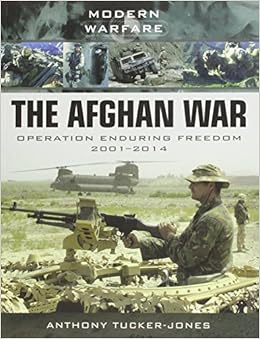Subtitle: "Operation Enduring Freedom 2001-2014."
Some observations I found useful:
Pagination corresponds to my digital version, and should not be seen as consistent with the hard copy.
18: “The very day after 9/11 Bush declared the attacks on the American homeland as acts of war and requested Congress provide the resources to fight the terrorists wherever they might be in the shape of $20 billion. Congress’s response was to approve double this sum. The following day US Secretary of State, Colin Powell, confirmed that Osama bin Laden, believed to be hiding in Afghanistan, was a key suspect.”
20: “Initially, al-Qaeda had planned hijacking a total of ten planes with the intention of crashing them into targets on both coasts of the US. The targets would have included nuclear power plants and tall buildings in California and Washington State. This could have been devastating, but as it was just four planes had the desired effect. The US asked itself what had it done to inspire such an act of hatred by militant members of islam? The international community was also put on notice that such outrages would become more commonplace in the world’s capitals over the next decade.
Following 9/11 the international community immediately rallied to the US. The very next day UN Security Council resolution 1368 and General Assembly resolution 56/1 called for immediate international cooperation to bring the perpetrators to justice. They also called for much broader cooperation against global terrorism and this was followed on 28 September 2001 by UN Security Council resolution 1373. Enacted under Chapter VII of the UN Charter, it required every member state to undertake seventeen measures against all those who support, directly or indirectly, acts of terrorism.
For the very first time the NATO invoked its mutual defence clause on 2 October 2001, whereby an attack on a member state is considered an attack on all.”
76: “NATO assumed control of ISAF in 2003 and expanded its area of responsibility from Kabul to encompass the country’s southern and eastern provinces three years later. This meant bringing the 12,000 American and other Coalition forces in the region under NATO control. It gave ISAF responsibility for the whole of Afghanistan, with around 40,000 troops. The upshot of this was greater integration in the south with the American-led Operation Enduring Freedom. However, the two operations continued to be directed separately, the rationale being that ISAF had a stabilisation and security mission, while OEF was overtly counter-terrorism.”
94: “ISAF was created in accordance with the Bonn Conference in December 2001. NATO assumed leadership of the ISAF operation on 11 August 2003, ending the six-month national rotations. The Alliance became responsible for the command, coordination and planning of the force, including the provision of a force commander and headquarters on the ground in Afghanistan. ISAF’s mandate was initially limited to providing security in and around Kabul. In October 2003, the United Nations extended ISAF’s mandate to cover the whole of Afghanistan (United Nations Security Council Resolution 1510), paving the way for an expansion of the mission across the country.”
127: “Urgent Operational Requirements (UORs) thrown up by the British army’s deployments to Afghanistan and Iraq resulted in the provision of a plethora of new military vehicles. Force protection became the primary focus for armoured vehicles, rather than the more traditional mechanised warfare role. While offensive battle groups still played their part, getting forces from A to B and conducting patrols unscathed in the face of a mounting IED threat became a greater priority. In total some 2,700 vehicles were supplied to the British army during the period November 2008 to April 2011 consisting of 18 different types.”
149: the international intervention in Afghanistan was in many ways a unique operation. While the application of air power and special forces brought the Taliban down, Coalition ground troops were needed to keep the resurgent Taliban at bay and safeguard the fledgling democratic government in Kabul. Like the Balkans Wars of the 1990s, Afghanistan became an unwelcome and often unpopular open-ended military commitment that dragged on for over a decade. As with the war in Bosnia, the campaign in Afghanistan only achieved a precarious peace after more and more ground troops were sucked in.”

No comments:
Post a Comment